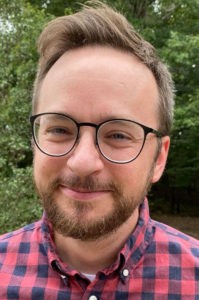In a recent issue of The Atlantic, novelist and playwright Ayad Akhtar argues that we have now arrived in the age of the Singularity, the hypothetical point in time at which technological growth becomes uncontrollable and irreversible, resulting in never-before-foreseeable changes to the human condition.
Akhtar says this point has come upon us not through a Terminator-esque weapons program, but through social media, through the advertising-industrial complex, and through the pervasive commoditization of normal human functions. All these avenues have eroded a sense of genuine dialogue between ideologies, reduced humanity to marketable props, and muddied the waters of truth in our culture.

Tyler Tankersley
These technological advancements have swept over us very quickly, promising to enhance our understanding through amassing more and more information. Akhtar laments these rapid changes and suggests that the counter-testimony is to embrace a set-apart way of living that is not fearful of going against cultural norms. Such determination is an act of sheer bravery in our world.
Psalm 25 is an acrostic song of petition, whose writer desperately seeks YHWH’s intervention in the midst of deeply felt jeopardy. The psalmist has placed their grounds for hope in YHWH’s steadfast love as an alternative to their own pursuits of truth. Rather than relying on the veracity of their own perspective or on the market-driven promises of the culture, the psalmist cries out to God:
Make me to know your ways, O LORD;
teach me your paths.
Lead me in your truth, and teach me,
for you are the God of my salvation;
for you I wait all day long. (Psalm 25:4-5)
For this psalmist, the starting place for salvation is the acknowledgment of their own inability to discern truth or paths that lead to life. The psalmist admits there is no alternative source of protection from enemies, from endless self-doubt or from vapid truths; it is only YHWH who can provide genuine salvation, only YHWH who can provide a path toward meaning, and only YHWH who can provide generative wisdom.
“In the life of faith, I do not believe there is any greater task of Christian discipleship than to offer an alternative path out of the Singularity-invaded culture and into the gospel-centric home of truth and wisdom.”
In the life of faith, I do not believe there is any greater task of Christian discipleship than to offer an alternative path out of the Singularity-invaded culture and into the gospel-centric home of truth and wisdom. There is no doubt that the very concept of truth itself has become diluted in our culture. The ramifications of that dilution have led to an erosion of communal trust and a tendency for our culture to paint those with whom we disagree in as unsavory a light as possible.
The Singularity also has employed deceptive and unseen algorithms that inaccurately portray the world in such a way so that our already-held worldview is merely affirmed rather than being healthily challenged. Akhtar observes: “Having one’s bias confirmed endlessly by a curated cascade of information reflecting back to you your preferences and opinions, second after second, understandably breeds an illusion of certainty. But certainty is nothing like wisdom; it might be something closer to wisdom’s opposite.”
Psalm 25 encourages the people of God not to seek truth merely in the advancements of their culture or in the depths of their own perspective, but to recognize their own neediness for wisdom and to live in ways that counter the continual commoditization of the human experience. When God’s people adhere to such humility, they are more generous with how they view themselves and with how they view their neighbors.
So Patrick Miller, in his reflection on the commandment against bearing false witness, can accurately and prophetically claim:
One of the primary dangers in the church today is the danger of not telling the truth about what one’s theological opponent says. When that happens, communal trust and the good neighborhood of the church will crumble, not in the face of differing views of moral and theological issues but on an underlying and profound mendacity.
It is the task of communities of faith to reject the false promises of certainty to which the Singularity continually lures us. Instead, we are called to join with the psalmist in declaring faith in YHWH who keeps covenant with salvation, truth and genuine wisdom.
Tyler Tankersley serves as senior pastor of Ardmore Baptist Church in Winston-Salem, N.C. He is a graduate of Central Baptist Theological Seminary. This reflection was written as a submission for the retreat Poems for Dangerous Times: A Gathering Around the Psalms. Tyler will be leading a workshop at this retreat on the intersections of technological trends and the Psalms.
Related articles:
Zoom church is helpful for now. But we cannot become satisfied with technology’s quasi-ability to facilitate communion | Opinion by Matt Dodrill
As Facebook evolves to Meta, what is the future of consciousness and control? | Analysis by Rick Pidcock
Facebook is the new voice of temptation whispering to the church in the digital wilderness / Analysis by Todd Thomason


